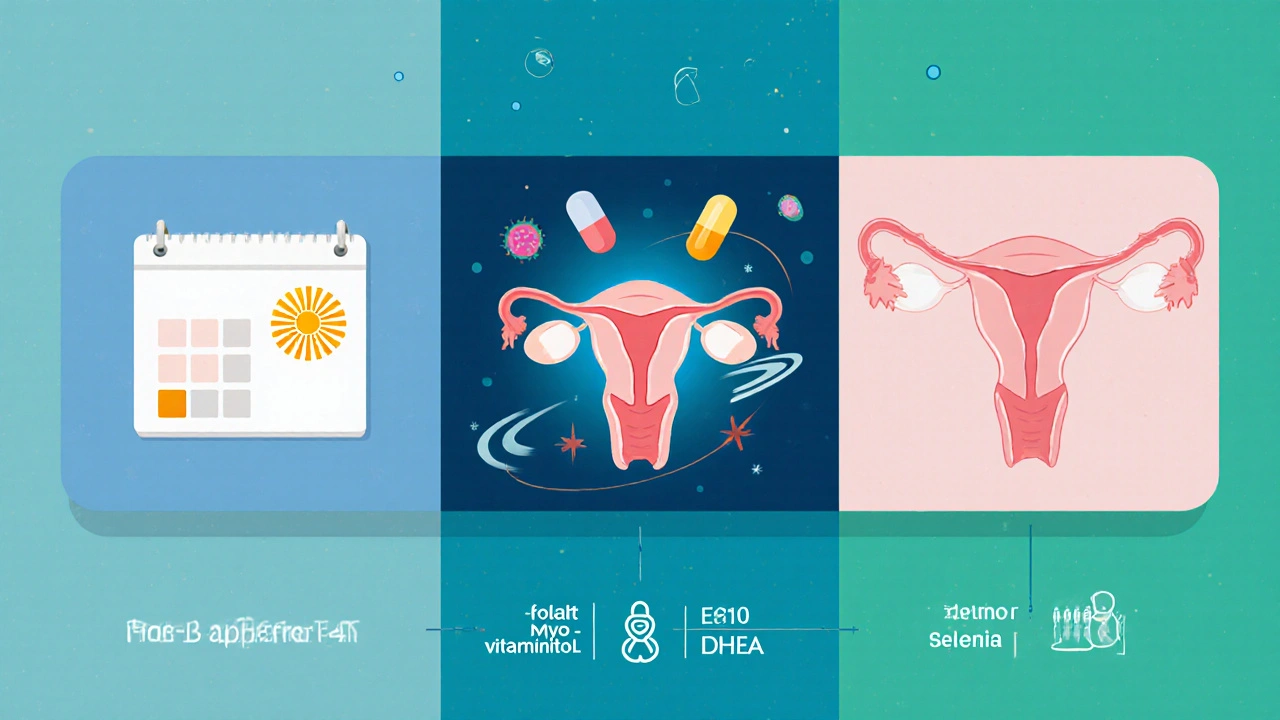 Oct, 5 2025
Oct, 5 2025
Fertility Supplement Dosage Calculator
Recommended Dosages
Top Fertility Supplements
Folate
Essential for DNA synthesis and preventing neural tube defects
Female FocusVitamin D
Modulates immune response and hormone production
Both GendersCoQ10
Mitochondrial antioxidant that fuels cellular energy
Both GendersMyo-Inositol
Enhances insulin sensitivity and ovarian function
Female FocusZinc
Crucial for sperm motility and hormone balance
Male FocusSelenium
Protects sperm DNA from oxidative damage
Male FocusWhen couples face infertility, many turn to fertility supplements dietary products designed to support reproductive health by providing key nutrients, antioxidants, and hormone‑balancing compounds. While they won’t replace a doctor‑prescribed plan, the right supplement can boost egg quality, improve sperm parameters, and smooth the road to pregnancy.
Key Takeaways
- Evidence supports specific nutrients - folate, vitamin D, zinc, CoQ10, myo‑inositol, and DHEA - for both male and female fertility.
- Supplements work best when paired with a balanced diet, lifestyle changes, and a clinician’s guidance.
- Dosage, timing, and product quality matter; look for third‑party testing and clear labeling.
- Potential side effects exist, especially with high‑dose hormone precursors like DHEA.
- Integrating supplements into IVF, IUI, or natural cycles can improve success rates, but results vary per individual.
Why Nutrition Matters in Infertility Treatment
Infertility isn’t just a mechanical issue; oxidative stress, hormonal imbalance, and micronutrient deficiencies can all sabotage conception. Studies from 2023‑2024 show that couples with adequate folate and vitamin D levels are up to 30% more likely to achieve pregnancy during assisted reproductive technology (ART). The body’s reproductive cells - eggs and sperm - are especially vulnerable to free‑radical damage, making antioxidant‑rich supplements a logical ally.
In the broader context of Infertility Treatment medical interventions such as IVF, IUI, and medication‑based ovulation induction, supplements act as an adjunct, preparing the body for the intensive hormonal environment of cycles and improving the quality of gametes that doctors work with.
Top Supplements Backed by Research
Below is a quick rundown of the most studied compounds, their typical dosages, and what the evidence says.
- Folate (Vitamin B9) essential for DNA synthesis and preventing neural‑tube defects - 400-800µg daily improves oocyte quality and reduces miscarriage risk.
- Vitamin D fat‑soluble vitamin that modulates immune response and hormone production - 2,000IU per day raises serum levels above 30ng/mL, correlating with higher implantation rates.
- Coenzyme Q10 (CoQ10) mitochondrial antioxidant that fuels cellular energy - 200-600mg/day for three months boosts egg mitochondrial activity, leading to more top‑quality embryos.
- Myo‑Inositol a sugar alcohol that enhances insulin sensitivity and ovarian function - 2g twice daily helps women with polycystic ovary syndrome (PCOS) restore regular ovulation.
- DHEA (Dehydroepiandrosterone) a hormone precursor that may increase ovarian reserve in women over 35 - 25mg three times daily for 8-12 weeks can raise antral follicle count and improve IVF outcomes.
- Zinc mineral crucial for sperm motility and hormone balance - 30mg/day improves male semen parameters and supports luteal phase support.
- Selenium trace element that protects sperm DNA from oxidative damage - 200µg/day shown to increase progressive motility in several RCTs.

How to Choose a Quality Supplement
Not all bottles are created equal. Here’s a quick checklist before you click “Add to Cart”.
- Third‑party testing: Look for USP, NSF, or Informed‑Sport certifications.
- Transparent label: Active ingredient amount, filler list, and expiry date should be clear.
- Formulation: Some nutrients are better absorbed together (e.g., folate with vitamin B12).
- Reputable brand: Companies with a track record in reproductive health are safer bets.
Integrating Supplements with Medical Protocols
Whether you’re on a natural cycle, undergoing intrauterine insemination (IUI), or preparing for in‑vitro fertilisation (IVF), timing matters.
- Pre‑treatment phase (3-6 months): Start folate, vitamin D, and CoQ10 early to build a nutrient reserve.
- Stimulation phase: Continue CoQ10 and myo‑inositol; DHEA may be introduced 8 weeks before trigger shots.
- Luteal phase: Zinc and selenium support the uterine lining and embryo implantation.
Always discuss the plan with your fertility specialist. Some clinics request a wash‑out period for high‑dose antioxidant protocols to avoid interference with hormone assays.
Potential Risks and Common Myths
Supplements are ‘natural’ but not always harmless. High doses of fat‑soluble vitamins can cause toxicity; excess DHEA may trigger acne or mood swings. Men should avoid mega‑doses of zinc, which can impair copper absorption and lower testosterone.
Myth #1: “If a supplement works for one couple, it works for all.” Reality: Genetics, age, and underlying conditions dictate response.
Myth #2: “More is better.” Over‑supplementation can actually increase oxidative stress, the very problem you’re trying to solve.

Practical Checklist for Couples
| Supplement | Typical Dose | Primary Benefit | Key Reference |
|---|---|---|---|
| Folate | 400‑800µg | DNA synthesis, reduces miscarriage | J. Reprod. Med. 2023 |
| Vitamin D | 2,000IU | Hormone regulation, implantation | Fertility Sci. 2024 |
| CoQ10 | 200‑600mg | Mitochondrial health, embryo quality | Human Reprod. 2022 |
| Myo‑Inositol | 2g BID | Insulin sensitivity, ovulation | Endocrine Rev. 2023 |
| DHEA | 25mg TID | Ovarian reserve, IVF success | Reprod. Biol. 2024 |
| Zinc | 30mg | Sperm motility, hormone balance | Andrology 2023 |
| Selenium | 200µg | Protects sperm DNA | J. Male Fertil. 2022 |
Before you start, schedule a blood panel to check baseline levels of vitamin D, folate, and trace minerals. Adjust the plan based on results - there’s no point taking megadoses if you’re already sufficient.
Next Steps for Couples Ready to Act
- Book a pre‑conception appointment and request a comprehensive micronutrient panel.
- Pick a reputable, third‑party‑tested supplement brand covering the nutrients above.
- Start the regimen at least three months before any fertility procedure.
- Track changes: keep a simple diary of menstrual patterns, mood, and any side effects.
- Re‑evaluate with your clinic after the first cycle - adjustments are normal.
Frequently Asked Questions
Can fertility supplements replace medication?
No. Supplements are adjuncts; they can improve the environment for eggs and sperm but won’t trigger ovulation or resolve severe anatomical issues.
How long should I take them before IVF?
Most clinics recommend a 12‑week pre‑treatment course for CoQ10, folate, and vitamin D, and an 8‑week course for DHEA.
Are there any supplements I should avoid?
High‑dose herbal extracts like clomiphene‑like botanicals can interfere with hormone tests. Also, megadoses of fat‑soluble vitamins (A, E) can be toxic.
Do men benefit from the same supplements?
Men see the most gain from zinc, selenium, and CoQ10 - nutrients that protect sperm DNA and boost motility.
What’s the safest way to test supplement quality?
Check for a Certificate of Analysis (CoA) on the manufacturer’s site, verify third‑party seals, and avoid products with proprietary blends that hide exact amounts.
Duke Gavrilovic
October 5, 2025 AT 13:50While the article covers a solid range of micronutrients, it’s worth noting that supplementation should be personalized; not every couple will benefit from a blanket protocol. A thorough baseline panel can prevent unnecessary excess and help target deficiencies more efficiently. Moreover, integrating these supplements with lifestyle adjustments-like stress reduction and regular exercise-creates a synergistic environment for reproductive health.
Abby VanSickle
October 6, 2025 AT 00:56Indeed, a balanced approach that couples clinical guidance with evidence‑based supplementation tends to yield the most reliable outcomes. It is essential to discuss any new regimen with your fertility specialist to avoid potential interactions with prescribed medications.
chris macdaddy
October 6, 2025 AT 12:03Yo, i been tryin those CoQ10 capsules for a few months and honestly i feel like my energy levelz went up, not just in the gym but also u know, overall vibe. just a heads up: don’t overdo the zinc, i read that mega doses can mess with copper and actually lower testosterone. stay chill and keep an eye on your labs.
Moumita Bhaumik
October 6, 2025 AT 23:10All these “natural” supplements are just a clever ploy by big pharma to keep us buying forever‑lasting pills. They’ll never tell you that the real problem is the toxic environment we live in-chemicals, EMF, processed food-so make sure you read the fine print before you swallow another bottle.
Sheila Hood
October 7, 2025 AT 10:16Oh sure, just pop a bottle of Myo‑Inositol and expect a miracle baby next week. Because nothing says ‘medical expertise’ like a 2‑gram twice‑daily ritual with zero supervision.
Melissa Jansson
October 7, 2025 AT 21:23While the sarcasm is noted, the pharmacokinetic profile of Myo‑Inositol actually demonstrates enhanced cellular uptake when paired with folate, optimizing the insulin‑sensitizing cascade. Moreover, the bioavailability of micronutrients can be significantly modulated by carrier matrices, a nuance often overlooked in oversimplified critiques.
Max Rogers
October 8, 2025 AT 08:30Just to add, the recommended 400‑800 µg folate daily aligns with the established RDA and helps reduce neural‑tube defects. If you’re on a multivitamin, double‑check the label to avoid exceeding the upper limit, especially when you’re also supplementing with prenatal formulas.
Louie Hadley
October 8, 2025 AT 19:36Exactly, keeping an eye on total intake is key. It’s easy to unintentionally stack folate from diet and a prenatal, which can lead to unnecessary excess.
Ginny Gladish
October 9, 2025 AT 06:43The data suggest a dose‑response relationship for vitamin D, where serum levels above 30 ng/mL correlate with improved implantation rates. However, one must consider the diminishing returns beyond 4,000 IU daily, as hypercalcemia risk rises. Hence, periodic blood work is advisable.
Faye Bormann
October 9, 2025 AT 17:50When it comes to fertility supplementation, the conversation often gets reduced to a checklist of “take this, take that,” but the reality is far more intricate and nuanced than a simple bullet‑point list can capture. First, one must recognize that micronutrient status is deeply intertwined with systemic inflammation, which itself can be driven by lifestyle factors such as diet, sleep quality, and chronic stress. Second, the timing of supplementation relative to the reproductive cycle matters; for instance, introducing CoQ10 three to six months prior to ovulation can enhance mitochondrial function in oocytes, thereby improving embryo quality. Third, the quality of the supplement-whether it is third‑party tested, free from contaminants, and formulated for optimal bioavailability-can dramatically influence outcomes, as low‑grade products may yield negligible physiological effects despite adherence to dosing guidelines. Fourth, the interactions between various nutrients should not be overlooked; excessive zinc, for example, can impede copper absorption, potentially leading to anemia or compromised immune function, which in turn can affect fertility. Fifth, patient age and underlying conditions, such as polycystic ovary syndrome or male factor infertility, dictate customized dosing strategies; a one‑size‑fits‑all approach is scientifically unsound. Sixth, the psychological dimension cannot be dismissed: couples who feel empowered by a proactive supplement regimen often report reduced anxiety, a factor that can positively affect hormonal balance. Seventh, it is essential to regularly reassess blood levels, as both deficiencies and toxicities can develop over time, particularly when high‑dose protocols like DHEA are employed. Eighth, clinicians should emphasize that supplements are adjuncts, not replacements, for evidence‑based medical interventions such as IVF or IUI, and that coordination with a reproductive endocrinologist remains paramount. Ninth, the socioeconomic aspect plays a role; high‑quality supplements can be costly, and access disparities may influence who can realistically follow these recommendations. Finally, ongoing research continues to refine our understanding of how specific nutrients influence gamete health, so staying informed about the latest peer‑reviewed studies is advisable for both patients and providers. In sum, while the supplement toolkit outlined in the article provides a solid foundation, success hinges on personalized assessment, vigilant monitoring, and an integrative approach that blends nutrition, lifestyle, and medical expertise.
Kathy Butterfield
October 10, 2025 AT 04:56Great overview! 😊
Zane Nelson
October 10, 2025 AT 16:03The article, while comprehensive, fails to interrogate the epistemic foundations of the cited studies, thereby offering a superficial veneer of credibility without substantive methodological critique.
Sahithi Bhasyam
October 11, 2025 AT 03:10Interesting point! However, the critique seems to overlook the fact that many of these studies do adhere to rigorous double‑blind designs, which bolsters their validity. 🌟🙌
mike putty
October 11, 2025 AT 14:16Staying positive is key-remember that even modest improvements in nutrient status can boost overall wellness, which in turn supports fertility journeys.
Kayla Reeves
October 12, 2025 AT 01:23It is morally questionable to market these supplements as miracle cures without acknowledging that many couples cannot afford them, thereby widening the gap between the privileged and those truly in need.
Abhinanda Mallick
October 12, 2025 AT 12:30From a nationalistic perspective, it is disconcerting how much of the supplement market is dominated by foreign conglomerates, often sidestepping local regulatory standards and compromising quality. This underscores the urgent need for sovereign production of nutraceuticals that adhere to our stringent health policies.
Richard Wieland
October 12, 2025 AT 23:36Supplements are tools, not panaceas; their efficacy depends on context, dosage, and individual physiology.